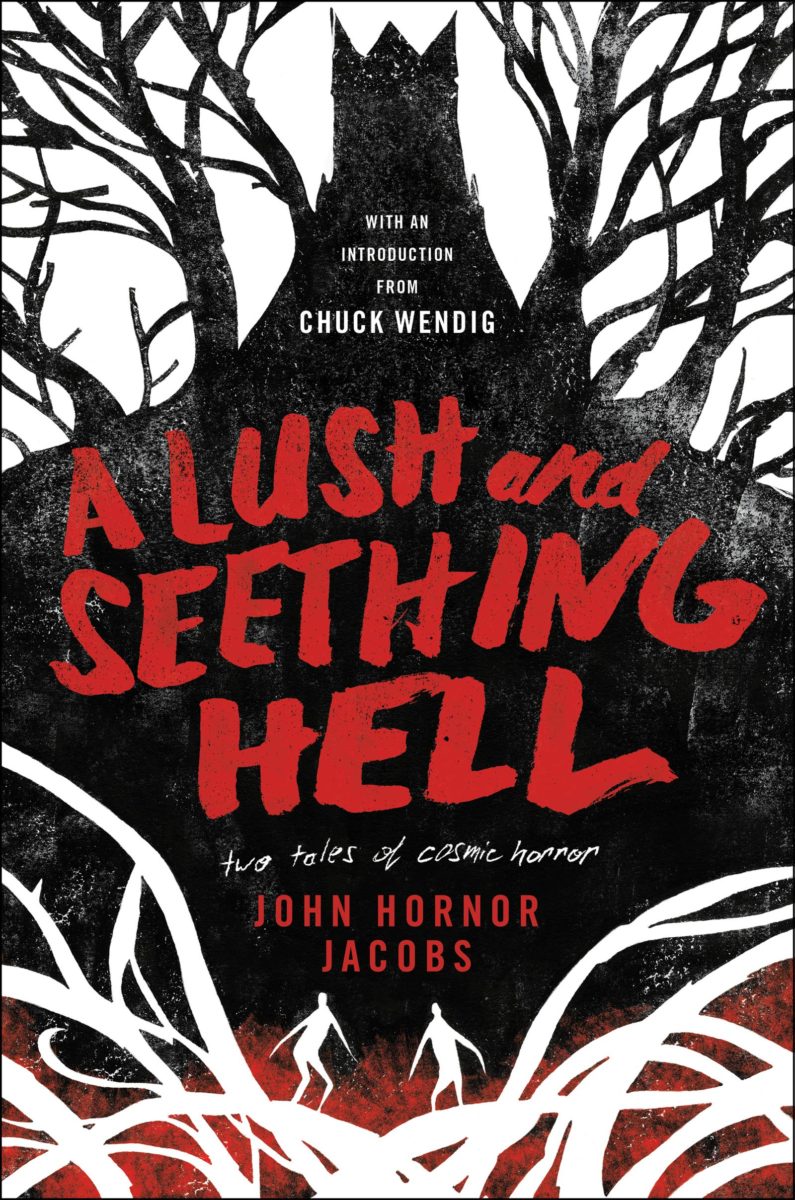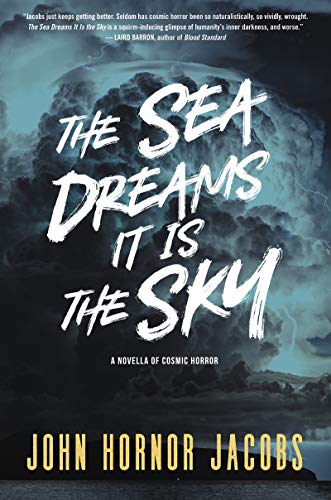This book is in contention for my favorite horror of 2019, but it’s already won for best title. A Lush and Seething Hell. How can you not want to read something that calls to mind decadence, decay, the crawling sensation of fear, the rage and fear and epic struggle—all of that and more? You have to know more about what a lush and seething hell would look like. And John Hornor Jacobs delivers. Oh, does he ever.
The book contains two novellas, The Sea Dreams It Is the Sky and My Heart Struck Sorrow. Since The Sea Dreams It Is the Sky was already released as an ebook, and since I already reviewed it, I’ll be focusing on the other, longer tale, My Heart Struck Sorrow.

The prose is not, as the title might suggest, lush. In fact, it’s precise to the point of terseness, as if Jacobs wanted to tell this story as quickly and accurately as possible so that he could escape its clutches. No, the lushness comes in spite of the prose: the Southern heat, the thick wilderness, and the decadent wealth of the white upper class. Harlan Parker can rub elbows with the rich, but it’s the common man he wants to meet, meet and record for posterity. He loves folk music and can’t believe his luck that the government is paying him to collect recordings.
The swelter of a southern summer is in full effect when he sets off, and I half expected to see the pages curl up at the edges from the humidity. Parker’s journey is a slog through mosquitoes and heat, but everyone around him insists that Hell is cold. And in the present day, a man named Cromwell begins his work in the interstitial period between Christmas and New Year’s, a no-time time that’s as cold as Missouri will ever get, and as untethered from the normal routines. Even the temperature creates a delicious sense of dissonance.
Cromwell is a man come undone from everything. His wife and son are dead, and their deaths soured the affair he was having. His colleagues are doing the Hallmark shuffle, extending cards and platitudes and then drawing back like he’s contagious, all except Hattie, who has a job for him. A woman has died and bequeathed her estate to the Library of Congress, including her grand-uncle’s papers and recordings. He was an early ethnomusicologist, and the chance to access his private holdings gets Cromwell moving again, despite his grief.
But what Cromwell finds is more than a trove of early 20th music. There are odd recordings—a screaming woman, a midnight encounter—and a diary that recounts a slow spiral into darkness. Did Harlan Parker lose his mind after one too many tragedies and stressors? Or did the songs he was pursuing—one song in particular—reveal things beyond human ken?
Parker is looking for all kinds of folk music, but focuses on a song known as “Stagger Lee” or “Stackolee” as a way to bridge the gap between white and African American playing. In the song, a man named Stacker or Stagger commits a murder and is hanged–but that may not be the end of things. As he travels further south he becomes more and more obsessed with finding variants of the song that tell of Stagger’s descent into Hell.
The song is contagious, much like the texts in Death Sentences or the videotape in The Ring. People catch it and have to pass it on, even though they know it’s poison, and Parker catches a particularly bad case. And in the present day, Cromwell starts to catch it too, seeing strange figures outside his hotel room and losing sleep to pursue what truths the diary might offer. Both become men obsessed with the tidbits of other stories, and in the process they create their own.

Now, some of Lovecraft’s “found” materials always struck me as contrived. Who sits down, writes out all the details of their horrible ordeals in excruciatingly overwrought prose, and only afterward turns up mad or dead? But here we have some solid reasons for the meticulous record-keeping: Parker is a scholar commissioned by the federal government. He keeps notes because it’s both his job and his passion. And Cromwell reads them for the same reasons, as well as because he needs something—anything—to occupy his mind. It makes perfect sense, too, why Cromwell and Parker go deeper and deeper into the mystery: they’re men with nothing to lose except themselves (and they’d very much like to lose that, too). Why not take refuge in someone else’s story?
Cosmic and Lovecraftian horror often has these nesting narratives, partly from tradition and partly because it creates gaps where ambiguity can seep in. What’s fiction? What’s misremembered, intentionally or not? What our minds fill into these gaps will always be scarier than any explicit mentions of gore or monsters.
Although Jacobs does come close, with his revival tent turned hideous sabbath, and his pale horse-turned-man covered in sores. It’s a doozy of a scene, and I loved every creepy word of it. Just as I loved the tantalizing hints about the reality behind the songs, about what Stagger Lee found in Hell and what all the singers found in the dark places of the world. The pacing and nature of each successive revelation was pitch perfect, with enough detail to be discomforting and enough mystery to keep you guessing. The whole cast of secondary characters was also a perfect blend or normal and wicked, innocent and obscene, drawing Cromwell and Parker on to their final nightmares.
Side note: I sure would love to read a book about Mollie, the girl with red flowers in her white hair who can shoot a sparrow in flight through the eye with her slingshot. At this point in the cosmic horror genre we kind of expect everyone to go mad, which can be chilling but can also be a little dated, just as swooning and fainting would be a dated. It’s refreshing to have a character, then, who declares herself unafraid, and who comes out mentally intact from a brush with the unknowable. I would also love to hear more about Oswell Munk, who saw the edges of madness and said “no, thank you, I’m good.” But ordinary people who make the sensible choice to avoid the edges of the void, or peer in, shrug, and say, “all right then” are a source of untapped story.
But our hapless heroes do not have the mental fortitude to resist the song of Stagger Lee, that “bad, bad man.” And thank goodness for that. Their stumbling, slouching path to terrible realization is a master class in horror that will keep you up late into the night.
